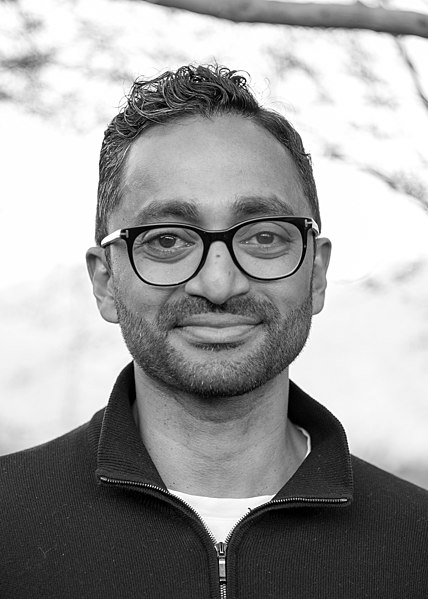Who is Chamath?
Chamath Palihapitiya is a Sri-Lankan-born Billionaire who grew up in Canada and now resides in the United States. He is presently a venture capitalist. He is most known for being the Chief Growth Officer at Facebook , where he worked from 2007 to 2011. Chamath is responsible for driving user growth for Facebook to 1 billion users during his time there. Chamath’s success and experience at Facebook gave him the means to leave the company in 2011 to start his own — Social Capital.
Upbringing
Chamath was born in Sri Lanka and immigrated to Canada with his family at a young age. They initially settled in Ottawa, Ontario. His mother was a housekeeper and eventually became a nurse’s aid. Chamath’s father worked various jobs such as selling encyclopedias, selling vacuum cleaners, and working at a photocopy store. He has said that his father was unemployed for long stretches of time and his mother was the sole breadwinner. His parents did what they had to to survive.
Chamath grew up without a bedroom or a bed. He had a mattress that they kept in the closet which he would take out to sleep on in the living room. Despite living on welfare, his parents scraped together money for music lessons and exposing their kids to art and culture. His family didn’t have a car for a long time and they all took the bus. Chamath attended a prominent high school in Ottawa where most of the kids came from “rich” families.
Chamath was a self-described “shady” kid while in high school. He was not that great in school but reasonably clever when it came to risk and was a card counter with an affinity for poker. Chamath was good at math which aided his card-counting in his early years.
Working Life
Chamath took a job working at Burger King (at 14) while he was in high school. During this time would give the money he made to his parents so they could buy bus passes. In 1991 the Rodney King riots happened in LA and the government of Ontario decided they wanted to subsidize work for any minority kid who can work. This was done through a program called Jobs Ontario Youth (JOY). Chamath rejected the typical placements at K-Mart and Sears.
Chamath’s father had kept a binder of rejection letters from jobs that he’d applied to throughout his life. Chamath took this binder and starting with the first letter, he began to apply. He would inform these jobs that there’s a program called JOY and that the government would subsidize his pay. He added that he is hardworking and smart and a company gave him a shot. That company was Newbridge Networks where he commuted 1.5 hours each way and got paid 10 dollars an hour. This was the job that “grew him up”.
Newbridge Networks
Newbridge was a well-known telecommunications startup in Ottawa when Chamath began working there. It was run by billionaire founder Terry Mathews who Chamath looked up to. Chamath took the bus to and from work each day and one day the Controller of the business offered him a ride to work. He had to drive through Chamath’s neighbourhood to get to Newbridge and one day, after seeing Chamath at work, stopped to offer him a ride. Chamath was able to ask him questions about Terry Mathews and how he ran the business.
Being around all the wealth being created at Newbridge at the time, Chamath realized that technology could be the escape from his current situation that he need. He then took a couple computer science classes in high school as a result — but it never really stuck. It turned out he didn’t have a passion for writing code but did have a passion for building companies like Newbridge — because it sounded interesting to him.
Chamath, then a teenager, quickly learned that to Terry Mathews money was simply an instrument of change — which re-wired Chamath’s views on money. He observed the dichotomy between Terry Mathews and Michael Cowpland who were both billionaires as a result of the sale of their previous business together — Mitel. He saw the good in Mathews and the not-so good in Cowpland in how they lived their lives.
” Be around high-functioning, high-quality people and just copy the shit that they do.”
He made sure to observe the not-so great things he saw from these billionaires and did not do the bad things and copied the good things, in his own life.
Silicon Valley
Chamath attended the University of Waterloo for electrical engineering. Upon graduation he took a job at BMO Nesbitt Burns as a derivatives trader. He took the job because it played on his desire to take risk. However, he left the job because he felt like he was going to get trapped by money.
Winamp
He moved to Silicon Valley in California and worked for a company that AOL had just bought called Winamp (as part of AOL music group). At the time AOL was trying to get a complicated merger done with Time Warner which meant that there was a lot of antitrust scrutiny surrounding the music space. Although this meant that they were handcuffed at Winamp, Chamath was part of the team that made the first 99 cent music download store. The store performed well and they were able to produce this due to the credit cards they had on file from AOL customers.
However, this store was never released to the public as the AOL “powers that be” shot the idea down for political reasons.
AOL
Chamath credits a mentor he had at AOL, Kevin Conroy with giving him a shot in his late 20s. Kevin took Chamath under his wing, taught him discipline, how to think and how to market. In return for his loyalty and “reasonable” work done, Conroy promoted him to Vice President and General Manager of AIM & ICQ. Chamath had control of that segment for 18 months before leaving AOL.
Mayfield Fund
After AOL Chamath joined Mayfield Fund, the venture firm he had been recruited to work at. He’s recalled that his salary at Mayfield at this time felt like “all the money in the world”. He was making $250,000 a year at Mayfield. This allowed him to get completely out of student debt, help his parents afford a home, and help out his sisters as well.

Chamath was still friends with Sean Parker who he knew from when he was at Winamp and Sean was running Napster. Sean brought Mark Zuckerberg with him to meet with Chamath and tell him about Facebook. AOL ended up doing an operating deal with Facebook (Facebook and AOL Instant Messenger integration). However, Sean Parker exited Facebook soon thereafter and Mark called Chamath to unwind the deal.
At the end of the unwinding process, Mark Zuckerberg told Chamath he should think about working at Facebook. Chamath ended up meeting some of the team and decided to come on board. He was so deep in the AIM business from his time at AOL that he could tell that Facebook was scratching the surface on something big, in a world post MySpace and Friendster. Chamath knew that even if he joined the Facebook team and ended up failing, the benefits would be worth it. He also realized that this venture would allow him to meet some of the smartest people in the world and “be in the game”. In the absolute worst case scenario, he would have learned if he could execute an early stage startup on his own, or not.
Chamath’s primary role at Facebook was Chief Growth Officer. He headed the team that was responsible for growing Facebook’s user base to 1 billion.
So how much did he make while at Facebook? Chamath was at Facebook from 2007 to 2011. It can be inferred that Chamath made millions during his 4 years at Facebook. He has said that he was able to invest that money into multiple startups to grow his wealth. He grew his wealth to the point he was able to found his venture firm Social Capital.
Social Capital
Social Capital is a venture capital firm founded by Chamath that had a balance sheet of 6 billion in 2021. The venture firm has helped companies go public through SPAC deals, which includes Virgin Galactic, SoFi, Clover Health and Opendoor. Social Capital has also made sizeable investments in companies such as Slack. The fund has invested in over 400 businesses with a core focus on the industries of healthcare, environmental protection and education. Moreover, Social Capital has reported returns on investment of 30% in 2020 and 2021. It is public knowledge that Chamath holds a 30% ownership stake in Social Capital, valuing him in the billions.

“Sometimes people want to be dismissive of how things have been done, and in other cases people want to be dismissive of new ways of doing things. Neither* are the way you have maximal impact and success.”
—Chamath







